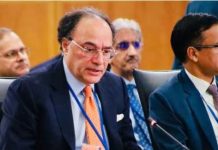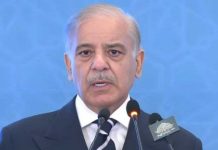ISLAMABAD, AUG 29 (DNA) —The Institute of Regional Studies (IRS) hosted an eminent speaker session on “Stabilizing Syria: Role of Regional Engagement”, featuring Dr. Mahjoob Zweiri, Non-Resident Senior Fellow at the Middle East Council on Global Affairs. The session examined Syria’s ongoing transition, the challenges of domestic reconstruction and the pivotal role of regional and international actors in ensuring long-term stability.
Opening his remarks, Dr. Zweiri stressed that the Middle East was experiencing a critical juncture. He outlined three phases of Syria’s recent trajectory: the immediate aftermath of December 8, 2024 events, the evolving dynamics of domestic politics and the regional dimensions shaping Syria’s future.
Dr. Zweiri highlighted the fragility of the Assad regime at the time and the failure of its regional alliances to provide timely support. The rapid shift in opinion among Turkey, Saudi Arabia, Qatar and Jordan alongside cautious recognition from Europe and the United States reflected how “regional players have done their homework correctly by engaging with Europe and the United States, trying to respond to their fears and concerns.”
Turning to domestic politics, Dr. Zweiri noted the importance of national identity and inclusivity in stabilizing Syria. “One identity politics, Syrian identity, means all Syrians are part of the future, regardless of their ethnicity or religion. It is not about who rules now, but about who contributes to Syria’s stability,” he explained. He also underscored the economic dimension. Improvements in infrastructure, salaries, and trade links with neighboring states were cited as crucial factors restoring public confidence.
Dr. Zweiri described Syria as a vital space for preventing further destabilization in the Middle East. “Syria is a place where you can achieve two major things: maintain the status quo by keeping the country’s borders intact and stop any potential civil war,” he stated, warning that renewed conflict would destabilize Jordan, Iraq, Turkey and beyond.
During the Q&A, Dr. Zweiri emphasized Pakistan’s potential contribution through diplomacy, investment, and humanitarian support. “Pakistan has strong ties with Turkey, Saudi Arabia, Qatar and Jordan. This network can be a great asset to help Syrians,” he noted, suggesting that Pakistan’s growing technological sector could play a role in Syria’s reconstruction. Addressing concerns about Israel’s aggression, Dr. Zweiri drew a parallel with post-9/11 U.S. wars, stressing that Israel’s current course was unsustainable and driven by political calculations.
The session concluded with an engaging discussion on regional alignments, the pressures of reconstruction and the delicate balance between external support and domestic resilience. The discussion underscored that sustained regional engagement coupled with inclusive governance in Syria, will be central to ensuring long-term peace and stability. — DNA

















